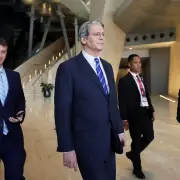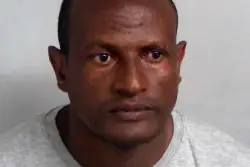Internal Report Shows the Military Always Wanted to Join the Drug War
A decade before President Donald Trump boasted of “hunting” alleged “narcoterrorists” on boats off the coast of Venezuela, the Defense Department was looking for new ways to get involved in the war on drugs. In a major report quietly issued by the federally funded Institute for Defense Analyses, researchers working for the Pentagon presented their findings, based on interviews with dozens of top drug traffickers incarcerated in the United States, on how to better disrupt transnational organized crime. One top-line prescription: More “direct military action.” The report, which was obtained by The Intercept through a Freedom of Information Act request and has never previously been made public, provides a window into the inner workings of major drug-trafficking networks. The report also shows the central role the Pentagon sees for itself in countering those networks at a time when the Trump administration is claiming broad war-making authorities and beginning to openly use the military to assassinate alleged smugglers. An attorney whose client was interviewed by researchers working for the Pentagon told The Intercept that the report proves that the recent sidelining of counternarcotics police in favor of bloodshed at sea is what military insiders have wanted for years. “There’s a huge difference between the Coast Guard or the Navy boarding what they suspect to be a boat with drugs coming into the United States, and prosecuting those people, and those people having lawyers and facing charges and appearing in court, and potentially going to prison if they’re convicted — and the summary execution of suspected drug dealers,” the lawyer said. “And now we’ve crossed that line.” The report, issued in 2015, comes to light as the U.S. has deployed warships, fighter jets, spy planes, and thousands of sailors to the Caribbean Sea, and has carried out several high-profile strikes on small boats in international waters, mostly coming from Venezuela, a country whose leaders Trump officials decry as illegitimate. The report shows glimmers of the mentality that Trump has made into policy with his tropical drone strikes, but the president has done little of what the Pentagon-funded researchers ultimately concluded would be the most effective means of taking on cartels: fighting corruption and arresting drug lords. “Bad Guys” The report is based on interviews with 62 drug-world figures, including 10 people described by the Drug Enforcement Administration as “leaders of the most prolific drug trafficking/money laundering organizations.” Supporting documents show that the idea of labeling drug gangs as foreign invaders and waging a literal war on them long predates Trump’s rise to power. “The purpose of this research is to gain a better understanding of how transnational (worldwide) criminal organizations are structured,” researchers wrote in a 2010 memo to prospective interview subjects obtained by The Intercept. “The DoD believes this knowledge will benefit U.S. military forces who are actively involved in engaging insurgent groups that have similar ‘organized crime’ characteristics or connections.” (The Pentagon did not respond to requests for comment, and the Institute for Defense Analyses declined to comment.) One of the report’s authors, a retired DEA chief and George W. Bush-era drug policy official named Joseph Keefe, told The Intercept that the project started in the thick of the Iraq War, when Keefe’s team saw Iraqi insurgents and drug cartels as similar organizations of “bad guys.” “The bad guys, the Iraqis we were fighting, were similar to the bad guys Drug Enforcement fights,” he said. “It was trying to look at things through the bad guys’ mind. People don’t look at that often.” Keefe said there is a role for the military in combating drug trafficking, but he criticized the new Trump policy of death from above. “Working together is helpful,” he said, “but not killing everybody.” Co-author William Simpkins, former acting administrator of the DEA, shared Keefe’s skepticism. Simpkins told The Intercept that, based on his more than three decades in drug enforcement, the people who cartels recruit for smuggling trips are by definition not high-ranking members of trafficking networks, and could even be forced to carry out the work. “I remember in Florida there would be shrimp boat after shrimp boat after shrimp boat. The Coast Guard would make these seizures, and they’d turn them over to us,” he said. “To me, blowing up that first boat is an extrajudicial killing — let’s face it.” “Most of these mutts,” said Simpkins, referring to the smugglers with a slur, “even if they were members of that organization, they probably weren’t among the most important members.” Attacking the boats, he argued, is not legal. “To me, blowing up that first boat is an extrajudicial killing — let’s face it,” Simpkins said. “That’s why that term exists.” “Kinetic” Targeting In a 2013 slide presentation that was also obtained by The Intercept, the research team touted their interim findings to the Defense Department. Alongside anodyne recommendations such as supporting anti-corruption efforts abroad, the presenters made what appears to be a call for the military to assassinate cartel leaders. Under the heading of “Direct Military Action Against Adversary Networks,” the authors propose “expanded targeting (kinetic and non-kinetic) of top lieutenants” in the cartel. It’s not clear from the document what exactly the line refers to. Keefe, who is listed as an author on the final report but not the slide presentation, did not recall the reference to “kinetic targeting” of cartel lieutenants. Simpkins also said he was not familiar with the slide presentation. (Christopher Ploszaj, who is listed as an author of the slide deck and the lead on the report, has died; the second slide deck author was unreachable.) Simpkins said that federal authorities have long collaborated with the military to interdict planes and boats smuggling drugs, but denied knowing of any past strikes on drug lords. He pointed out that even someone as notorious and violent as Pablo Escobar, who had blown up a plane with Americans aboard, was marked for arrest, not assassination, though he ultimately died in a gunfight with Colombian police. The “targeting” recommendation does not appear in the final report, but the document does include passing mentions to “war gaming” and “operational planning.” Instead, the report sticks mainly to advice grounded in what the traffickers themselves said is effective: treating drugs as a law enforcement problem. Still, the very existence of the document, compiling insights from convicted leaders of Mexican and Colombian cartels and Colombian paramilitaries, as well as money launderers, fixers, and a lone Al Qaeda member, suggests that the military has long been reluctant to leave anti-drug operations to the State Department or federal law enforcement agencies. Before “Narcoterrorism” Long before Trump made “narcoterrorism” a household word — and a justification for the use of military force against alleged drug-smuggling boats — the Defense Department research linked organized crime to the national security threat of terrorism. The opening paragraph of the study accuses “transnational criminal organizations” of threatening state sovereignty by “facilitating insurgent and terrorist activity through illicit trade, or perpetuating acts of terrorism to create criminal enclaves within a state.” Latin American history professor Alexander Aviña argued that this kind of rhetoric is meant to tee up military intervention. “They’re trying to set up a solution,” he said. “And if you have a failed state or a captured state, then the solution, of course, is going to have to be military from the U.S. perspective.” The report claims that 20 of 53 groups designated at the time as foreign terrorist organizations could be definitively tied to drug trafficking. For this conclusion, the authors rely on the 2011 congressional testimony of career DEA official Derek Maltz, a longtime advocate for the most hard-line anti-drug policies, including the designation of cartels as terrorist organizations. Maltz went on to serve as acting DEA head under Trump before retiring this year. Maltz praised the recent strikes on boats from Venezuela. “I’m sure the terrorists will get the message soon and we will see a huge decrease in poison in our communities,” he wrote on X. Thank you ?@POTUS? and the ?@SecWar? for putting Americans first. I’m sure the terrorists will get the message soon and we will see a huge decrease in poison in our communities. ????????? https://t.co/LpwsXGT4hG— Derek Maltz Sr (@derekmaltz_sr) September 15, 2025 The authors of the Institute for Defense Analyses report, for their part, distinguish between violence involving cartels and that carried out by Muslim extremists — a distinction that is supported by interviews with incarcerated veterans of the drug trade. Mexican cartel members told researchers that they cared little about the politics of those they did business with, but they would not want the law enforcement scrutiny that would come with directly helping terror groups by, say, sneaking a high-level jihadist over the southern border. War on Terror Impunity In the decade since launching his presidential bid by saying Mexicans came to the U.S. “bringing drugs,” Trump has reportedly fixated on the idea of military strikes on drug labs, a tactic that has since become a matter of GOP doctrine. Republicans in Congress sought to authorize outright war on transnational gangs in Central and South America through legislation in 2023, without success. The key to going ahead has rested in large part on the term “narcoterrorist.” “The idea of narco-terrorism has been a really powerful idea that the right has used against Latin America since the early to mid-1980s,” Aviña said. “And I feel like this report and everything that’s come since then is that kind of argument, but on steroids. The ground has been prepared for a while to link the war on drugs, to the war on migrants, to what used to be the waning part of the Cold War. It just got replaced after 2001 with the war on terror.” Related License to Kill: Trump’s Extrajudicial Executions Bringing war on terror impunity to the drug war, Trump seems intent on cutting out the middleman. Rather than trying to jump through intelligence hoops to connect wholesale drug dealers to far-off Islamic extremists, the administration now argues that importing drugs to the U.S. is itself terrorism. Trump’s lawyers have sought to justify not seeking input from Congress for the recent wave of deadly attacks by telling legislators that the strikes were against “designated terrorist organizations” and that the dead were combatants in a “noninternational armed conflict,” terms considered by critics to be legally meaningless. (With no Republican support, efforts to assert Congress’s war powers have failed.) The administration now argues that importing drugs to the U.S. is itself terrorism. Trump officials have also begun using the “narcoterrorist” rhetoric when discussing Venezuelan President Nicolás Maduro, justifying the potential use of force against his regime by saying that Maduro directs the drug trafficking efforts of gangs like Tren de Aragua, which Trump has designated as a terror group. U.S. intelligence findings, however, have undercut the assertions of links between Maduro and the gangs. Referring to the second recent strike on a boat in the Caribbean, the president wrote on his Truth Social site on September 15, “This morning, on my Orders, U.S. Military Forces conducted a SECOND Kinetic Strike against positively identified, extraordinarily violent drug trafficking cartels and narcoterrorists.” A Better Way? Aerial footage of exploding dinghies may make for compelling social media fodder, but the top counternarcotics strategy recommended by the report is decidedly less dramatic. Even as the report argues for a military role in the fight against drugs, the key conclusions drawn from the interviews place the centerpiece of effective counternarcotics policy elsewhere. All but one of the 62 interviewees told researchers that official corruption was the “most important factor for their organization’s success.” Corruption in Colombia was described as so widespread and essential to drug operations that one drug organization reportedly employed a “corruption whip” in each chamber of Colombian Congress whose main job was to coordinate payments to politicians and track votes that could affect illicit business. Other interviews yielded a rich menu of what bribes could by you: for $5-10 million, you could get a police or military official to assassinate a rival trafficker; for $100,000, one subject purchased information about extradition orders against him; and for a mere $10,000 the same trafficker acquired tips about upcoming raids on his facilities. Related Trial of Mexico’s Former Top Cop Neglected U.S. Role in War on Drugs In response, the report’s authors said that the U.S. should support anti-corruption efforts around the globe — which would be a major shift in American foreign policy. As the authors acknowledge in a footnote, instead of applying pressure to corrupt governments abroad, the U.S. often provides them with the most aid. If the U.S. was tacitly supporting foreign corruption before, since Trump took office for the second time, the government has started actively looking the other way. His State Department ordered an end to reporting on international human rights abuses and corruption. He has partnered with autocratic leaders to fly immigrants to prisons in third countries. And he and his family have pursued a dizzying array of foreign real estate and crypto deals, with foreign governments and businesspeople openly buying access to the president. Trump also suspended enforcement of the Foreign Corrupt Practices Act for four months after taking office. Upon lifting the pause in June, Department of Justice leadership released guidelines stating that cartels would be the focus of corruption enforcement going forward, and investigations would no longer linger on what the administration described as the “generally accepted business courtesies” of legitimate corporations. Even as he has ostensibly shifted the focus of anti-corruption enforcement to drug-trafficking, Trump seems to be putting the military at the forefront of a counternarcotics strategy in a way not seen since the U.S. invaded Panama in 1989. For Simpkins, the report co-author, this approach is bound to fall short. “As long as there’s demand, the supply is going to keep coming in.” Reflecting on his long career at all levels of federal counternarcotics work, Simpkins said that striking drug boats might curb the use of boats for smuggling in the near term, but he doubts the U.S. will ever stop the flow of drugs without massive societal change to curb drug use. “As long as there’s demand, the supply is going to keep coming in,” he said. “Locking everybody up hasn’t been able to solve it. Blowing up 11 people on a rickety, shitty boat isn’t going to solve it.” The post Internal Report Shows the Military Always Wanted to Join the Drug War appeared first on The Intercept.


